The number of Atlantic salmon caught by rod in the River Tweed catchment rose by more than 800 last year, despite extremely low water levels from May to September.
The River Tweed Commission annual report said 6,690 salmon were caught in 2022, above 2021’s 5,862 total — but slightly under the 6,810 five-year average.
The report also drew attention to the issues caused by the summer’s heatwaves and reduced rainfall, which led to SEPA “curtailing licensed water abstraction in the catchment for the first time.”
The Commission said: “Water temperatures exceeded 24°C in some places and as warm water holds less dissolved oxygen – which is vital for fish survival – than cold water, this caused significant stress for salmon, sea and brown trout stocks in the river.
“The low water levels also led to changes to the nutrient concentration levels in some parts of the catchment, resulting in areas of algal bloom which further uses up the oxygen required by fish and other creatures to survive.
“Low river flows also make migration between river pools much more difficult, often denying access to shade and protection from predators.
“The River Tweed Commission provided advice to stop fishing on some of the hottest days, and the commissioners were pleased to see anglers showing respect and restraint in recognition of the difficulties caused to fish by the conditions.
“The report also noted that 96% of salmon caught in 2022 were returned to the water, the highest ever figure and a reflection of the angling community’s recognition of the importance of long-term sustainability.”
Clerk to the River Tweed Commission, Jamie Stewart, said: “The Tweed is a Special Area of Conservation for salmon and we were pleased to see an increase in last year’s catch within the catchment.
“It is evident, however, that wild salmon still face significant issues due to a range of factors including climate change, pollution and predation.
“We’re working hard to address as many of these as we can, both with partner organisations and landowners, but also with the Scottish Government, whose recently-published Wild Salmon Implementation Strategy we welcome.
“We’re also delighted to have the support of anglers from home and abroad, whose behaviour when they fish here is demonstrating a deep respect for the river environment.
“The Tweed is one of the world’s great salmon rivers, with fishing providing a significant contribution to the local economy, so we all want to do as much as we can to protect this precious natural resource.”
